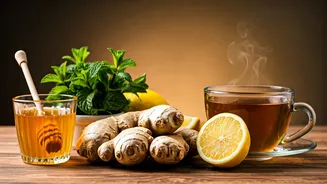Honey and Lemon
Honey and lemon are a classic combination for soothing coughs and colds. Honey has natural antibacterial properties and can help suppress coughing, while
lemon provides vitamin C, which boosts the immune system. To prepare this remedy, mix one to two tablespoons of honey with the juice of half a lemon in a mug. Add warm water and stir well. You can drink this mixture several times a day. For added benefit, consider adding a pinch of ground ginger, known for its anti-inflammatory effects. This simple recipe is particularly effective for soothing sore throats and reducing coughing fits, offering a gentle yet potent approach to alleviate cold symptoms. Remember, it is important to consult a healthcare professional before giving honey to infants under one year old due to the risk of botulism.
Ginger Tea Power
Ginger tea is another effective remedy due to ginger's anti-inflammatory and antioxidant properties. It can help reduce congestion and soothe a sore throat. To make ginger tea, peel and slice a small piece of fresh ginger (about an inch). Boil the ginger slices in two cups of water for about 10-15 minutes. Strain the tea and add honey and lemon to taste. Drinking warm ginger tea throughout the day can significantly alleviate cough and cold symptoms. Consider adding a pinch of black pepper or a cinnamon stick for enhanced flavor and benefits. Ginger's natural compounds work to reduce inflammation in the respiratory system, making it easier to breathe and reducing the frequency of coughing.
Garlic's Healing Touch
Garlic, with its potent antiviral and antibacterial properties, can be a great ally against coughs and colds. It contains allicin, a compound known for fighting infections. To use garlic as a remedy, you can add crushed garlic to your meals or make a garlic-infused tea. To prepare garlic tea, simmer a few crushed garlic cloves in water for about 10 minutes. Strain the tea and add honey or lemon to make it more palatable. Inhaling the steam from garlic can also help clear nasal passages. For those who find the taste of garlic overwhelming, consider using garlic supplements or adding it to your meals in smaller, less noticeable quantities. Garlic's ability to boost the immune system and combat infections makes it a valuable remedy for cough and cold relief.
Turmeric's Golden Boost
Turmeric, a spice with powerful anti-inflammatory and antioxidant properties, can aid in relieving cough and cold symptoms. Curcumin, the active compound in turmeric, helps fight inflammation and boost the immune system. One simple method is to make turmeric milk. Add a teaspoon of turmeric powder to a cup of warm milk (dairy or non-dairy) and add a pinch of black pepper to enhance absorption. Drinking this concoction before bed can soothe a sore throat and reduce coughing. Another option is to add turmeric to your meals or use it in a tea with honey and ginger. Turmeric's benefits include reducing inflammation in the respiratory system, which helps alleviate congestion and discomfort associated with colds and coughs.
Steam Inhalation Therapy
Steam inhalation is a simple yet effective remedy for clearing congestion and soothing irritated airways. The steam helps to loosen mucus and ease breathing. To use steam inhalation, fill a bowl with hot water (not boiling) and add a few drops of essential oils like eucalyptus or peppermint, known for their decongestant properties. Lean over the bowl, keeping your face a safe distance away, and cover your head with a towel to trap the steam. Inhale the steam for 10-15 minutes. Alternatively, you can take a hot shower or sit in a steamy bathroom. Steam inhalation is an accessible and easy-to-do practice that provides almost immediate relief from congestion and allows for easier breathing. Be careful not to burn yourself with the steam and supervise children closely.
Salt Water Gargles
Salt water gargles are a straightforward remedy for soothing sore throats and reducing inflammation caused by coughs and colds. Salt helps to draw out fluids from inflamed tissues and can kill bacteria. To make a salt water gargle, dissolve half a teaspoon of salt in a glass of warm water. Gargle the solution for about 30 seconds several times a day. This simple practice can significantly reduce throat irritation and alleviate pain. In addition to salt, some people add a small amount of baking soda to the gargle, which can help neutralize acids and further soothe the throat. Regularly using salt water gargles helps to keep the throat moist and reduces the likelihood of infection. It's a low-cost, effective, and readily available remedy.
Eucalyptus Oil Relief
Eucalyptus oil is well-known for its decongestant properties and ability to soothe coughs. The oil contains compounds that help to break down mucus and ease breathing. There are several ways to utilize eucalyptus oil. One is to add a few drops to a diffuser or humidifier to release the vapors into the air. Alternatively, you can add a few drops to a bowl of hot water and inhale the steam. Always dilute eucalyptus oil before use; it is often mixed with a carrier oil like coconut or almond oil for topical applications. Eucalyptus oil can be applied topically to the chest and back to relieve congestion. Eucalyptus's potent aroma and therapeutic qualities make it a popular and effective choice for treating cold and cough symptoms.
Marshmallow Root Benefits
Marshmallow root contains mucilage, a substance that coats and soothes irritated mucous membranes, making it an excellent remedy for coughs and sore throats. You can make marshmallow root tea by steeping the root in hot water for a few hours or overnight. This creates a soothing and thick tea that coats the throat and reduces irritation. Marshmallow root tea can be consumed several times a day to provide continuous relief. Mucilage in marshmallow root acts as a natural cough suppressant. The tea also soothes inflamed airways, reducing cough severity. Using marshmallow root, available in various forms, is a natural way to mitigate the symptoms of coughs and colds. Always check for any allergies before using it.
Elderberry Syrup Power
Elderberry syrup has been used for centuries to combat colds and flu. Elderberries are packed with antioxidants and compounds that boost the immune system, helping to fight off viral infections. You can purchase elderberry syrup or make it at home. To make your own, simmer elderberries with water, honey, and sometimes spices like cinnamon and cloves. Drinking elderberry syrup can reduce the duration and severity of cold and flu symptoms. Ensure that the elderberries are cooked, as raw elderberries can be toxic. Elderberry's antiviral properties make it a beneficial choice. This remedy is more suitable for adults and children; consult a doctor before use, especially for infants and children with chronic health conditions.
Rest, Hydration & Nutrition
While these remedies can alleviate symptoms, getting enough rest, staying hydrated, and maintaining proper nutrition are essential for recovery from colds and coughs. Adequate rest allows your body to focus its energy on healing and fighting the infection. Drinking plenty of fluids, such as water, herbal teas, and clear broths, helps to thin mucus and prevent dehydration. Eating nutritious foods, rich in vitamins and minerals, strengthens your immune system. Consume fruits, vegetables, and lean proteins, and avoid processed foods and sugary drinks. Combining these lifestyle choices with the home remedies will result in a faster recovery. Prioritizing these foundational elements will help your body recover more efficiently and prevent the development of secondary infections.














